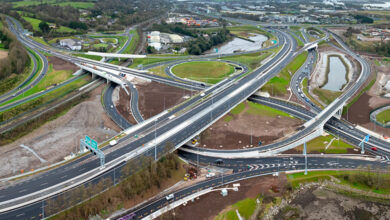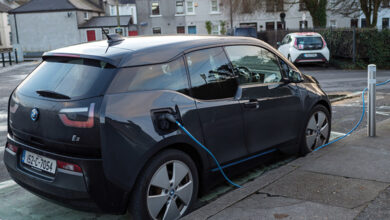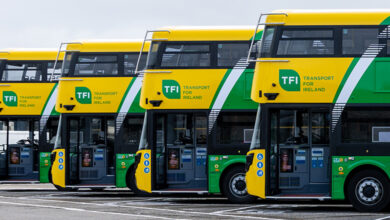Road haulage in the coming decade

The Government published the Road Haulage Strategy 2022-2031 in December 2022, setting out the plan for how the hard-to-abate subsector will play its part in reducing transport emissions by 50 per cent by 2030.
The publication of the strategy fulfils a Programme for Government pledge to produce the State’s first-ever government strategy solely dedicated to the haulage and road freight sector. The strategy is focused on “generating efficiencies, improving standards, securing jobs and helping the road freight sector move to a low-carbon future” and is organised around seven themes:
1. Brexit, Covid-19, and crisis management;
2. sustainability and decarbonisation;
3. road infrastructure and usage charging;
4. integrated transport planning and intermodal transport;
5. road safety and enforcement;
6. the EU Mobility Package and road transport operator licensing; and
7. labour market and skills.
With 99 per cent of the heavy goods vehicles (HGVs) on Irish roads currently diesel fuelled, road haulage is among the most hard-to-abate sectors in terms of decarbonisation, especially when it is factored in that the International Transport Forum forecasts that global freight transport demand across all modes will more than double over the next three decades. The Road Haulage Strategy thus attempts to tackle somewhat conflicting challenges: that of a subsector that must grow in terms of production but contract in terms of emissions.
In the broader context, transport emissions in 2021 – the most recent on record – were 24.5 per cent below the 2007 peak, primarily due to Covid-19 restrictions and improved fuel efficiency. Private cars made up the bulk of transport sector emissions in 2020 – the most recent year for which modal shares are available – with 54 per cent. HGVs accounted for 20 per cent of transport emissions, with light goods vehicles accounting for 18 per cent.
As the strategy notes, the next phase of the Climate Action Plan will “see the overall burden of emissions reduction falling to a greater extent on private cares in the medium term to 2030”. Targets to introduce 3,500 low-emission HGVs on Irish roads and 30 per cent of new sales in medium-duty vehicles and HGVs to be zero-emission by 2030 are regarded as “ambitious – but achievable”.
It is also noted that it will “take time” for battery electric vehicles and other alternatively fuelled vehicles to become widely available across Europe, with it also said that Ireland’s geographic location and the requirement for right-hand drive vehicles “may lead to slower delivery” in Ireland.
Biofuel blending
The mixing of renewable fuels into liquid fossil fuels, is thus cited as having a key role to play as a transitional measure that will “help to reduce emissions in existing fleets for both passenger transport and road freight”. The decarbonisation section of the strategy includes short-term actions such as:
• the maintenance and expansion of the Alternatively Fuelled Heavy Duty Vehicle Grant Scheme, a grant supplied by the Department of Transport through Transport Infrastructure Ireland that is calculated as a percentage of the difference in price between the new alternatively fuelled HGV and its diesel equivalent;
• the updating of the national policy framework on alternative fuels in transport;
• supporting Zero Emission Vehicles Ireland to “enable the provision of charging infrastructure for HGVs”;
• the establishment of an accreditation system for eco-driving courses; and
• the completion of a feasibility study examining freight consolidation centres.
|
Haulage and road freight in Ireland by numbers 41,850 HGVs taxed in Ireland, at end July 2022 22,796 licensed haulage HGVs 61% of HGVs in July 2022 were 10 years old or younger 100,900 people employed in transport and storage in Ireland as of Q2 2022 |
The strategy sets out a roadmap for decarbonisation in the haulage sector, as governed by Climate Action Plan 2023 targets, which includes already-enacted measures such as the National EV Charging Infrastructure Strategy and the Biofuels Obligation Scheme and its 20 per cent by 2030 target. Also included are forthcoming measures such as the national hydrogen strategy, which will “consider the potential demand for hydrogen across the transport sector in Ireland and examine how hydrogen could complement electricity as a zero-carbon transport fuel for heavy-duty vehicles”.
Skills gap
After the considerable decarbonisation demands on the subsector, perhaps the most notable challenge faced by those involved in haulage is the critical skills gap that has been identified in the areas of freight transport, distribution, and logistics. Particularly, shortages of HGV drivers have been emphasised.
Respondents to the public consultation period of the report cited current working conditions of HGV drivers as a barrier to overcoming the shortage. The report notes that an EU directive on minimum wages and collective bargaining was adopted by the European Council in October 2022, which should strengthen the collective bargaining position of workers, and that a report by the Labour Employer Economic Forum in Ireland reviewing bargaining and industrial relations is currently under consideration by the Department of Enterprise, Trade and Employment.
The Logistics and Supply Chain Skills Group published recommendations in 2021 on how to tackle the shortage, with the recommendations aimed at improving the supply issue without undermining the working conditions of the drivers and other road users. New apprenticeships and traineeships have also been started to address the skills gap, such as the Logistics Associate Apprenticeship at Technological University Dublin, the Operations and Commercial Driving Apprenticeship at Atlantic Technological University, and the Logistics and Distribution Traineeship.
Short-term actions included within the strategy to address the shortage also include the conclusion of consideration over license exchange agreements with North Macedonia and Argentina, as well as the commencement of potential new agreements with other states, and the establishment of research workstreams on the attractiveness of the industry.
Actions to be undertaken under the strategy’s aegis in the other thematic areas also include a commitment to a public consultation on the introduction of fixed charge penalties for certain road transport offences by professional drivers, a review of the Driver Certificate of Professional Competence with a view to reform of the qualification, and the implementation of EU legislation mandated through the EU Mobility Package.
The strategy is slated for review in 2027 by the Road Freight Forum and the Department of Transport, “providing an opportunity to evaluate, assess and modify mid- and long-term enablers and identify new actions as required”.





